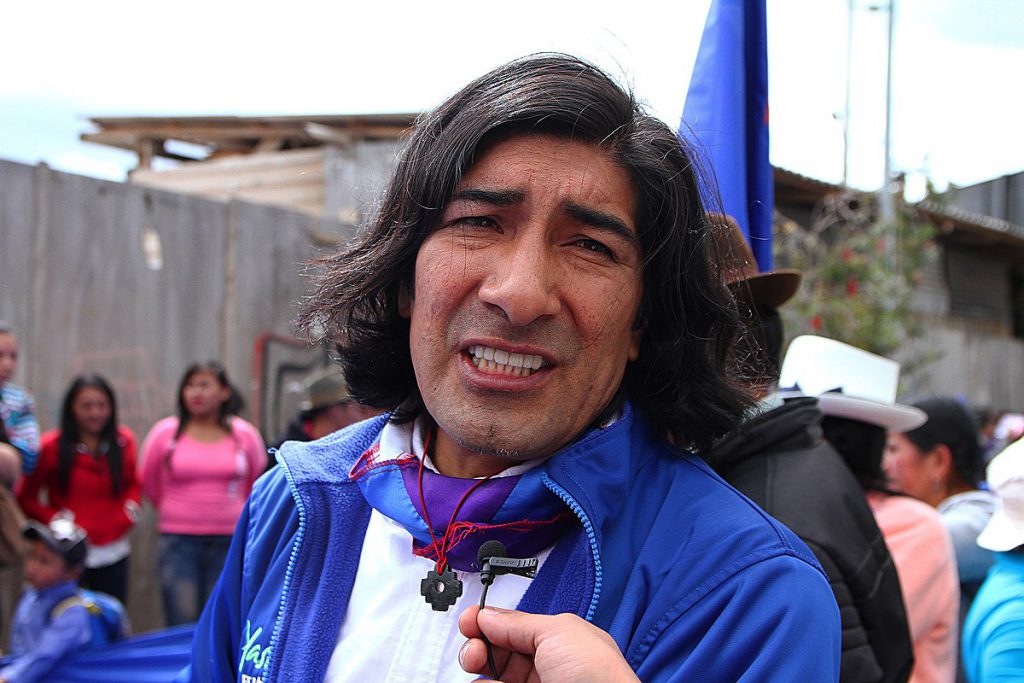Strong showing for Ecuador’s Perez signals backlash against mining industry

Surprisingly strong support for Ecuadorean environmental presidential candidate Yaku Perez in Sunday’s election shows the country’s nascent mining industry faces growing backlash that could weaken its expansion plans.
Perez, a lawyer and indigenous activist, won nearly 20% of the votes in last week’s first-round presidential election on promises that he would call a referendum on prohibiting industrial mining in order to protect watersheds.
The vote count now shows Perez trailing pro-market conservative banker Guillermo Lasso, and thus less likely to advance to the runoff on April 11.
National Electoral Council figures currently show Perez with 19.47% of the vote and 19.69% for Lasso.
The two are vying to enter the runoff against left-wing candidate Andres Arauz, who with 32.62% of the vote, won the first round on a platform of returning to the socialist economic platform of former President Rafael Correa.
His allies in the Amazon region say they will promote “post-extractivist” economic development in indigenous territories, many of which are near the country’s mining and oil industry operations
But overall support for Perez shows his message resonated with Ecuadoreans, and the results of the legislative election that was also held on Sunday show his party will be the second-largest in congress.
His allies in the Amazon region say they will promote “post-extractivist” economic development in indigenous territories, many of which are near the country’s mining and oil industry operations.
“It is not a good sign for investments in a critical sector,” said Patricio Vargas, president of the mining industry association for the province of Azuay, home to various mining projects. “We would like (Perez) to reflect on the real magnitude of what is being proposed, since we do not have viable and immediate alternatives beyond mining.”
Ecuador has for years attempted to develop its mining industry as an alternative to oil. But opposition by community groups and indigenous activists have made it difficult to get major projects off the ground.
Mining brought in more than $800 million in export revenue in 2020, according to official data.
In a further sign of shifting public opinion about mining, voters in the city of Cuenca in a referendum supported a ban on mining in the area of rivers that cross through the city, according to preliminary data.
Industry leaders say the results will not affect existing projects such as Rio Blanco, led by the Chinese consortium Ecuagoldmining, and Loma Larga, being developed by Canada’s INV Metals Inc. But they say it will dampen investor interest for future ventures.
“The (referendum) is the worst message for investors who are in the country or those who are watching from the outside,” said Fernando Benalcazar, a former deputy mining minister. “The political issue could affect the development of mining.”
Perez, 51, has said the country should promote the development of agriculture and tourism rather than industrial mining.
Arauz has said he will seek greater participation of indigenous communities and will carry out a review of existing mining concessions to ensure they are complying with the law.
Lasso, meanwhile, promises to attract investment to the sector by ensuring there are clear environmental rules.
Perez on Thursday called for a recount in seven provinces and asked for the intervention of the United Nations and the Organization of American States against what he called electoral fraud.
“They are not stealing Yaku Perez’s votes, they are stealing a whole project, a dream, a hope for the people,” he said at a rally outside the election council headquarters in Quito.
(By Alexandra Valencia and Brian Ellsworth; Editing by Diane Craft)
{{ commodity.name }}
{{ post.title }}
{{ post.date }}




Comments